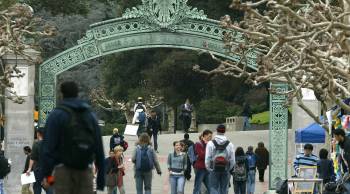UC proposes to raise tuition every year for 5 years
The University of California is about to get a lot more expensive.
After a three-year tuition freeze, the UC Board of Regents approved a plan today that would raise prices by as much as 5 percent a year for the next 5 years, unless the state comes up with more funding. That would ultimately push tuition well past $15,000 a year.
The reason? UC President Janet Napolitano says state funding hasn’t kept up with rising costs.
Ten years ago, the state covered about 60 percent of a UC student’s tuition, according to an editorial in the Los Angeles Times. Families were on the hook for about 40 percent. Now, it’s the other way around.
“In the last decade, tuition has doubled for California students,” says Michele Siqueiros, president of the Campaign for College Opportunity.
She says there’s good reason for taxpayers to invest more in higher education.
“College-educated Californians earn more money, pay more taxes and use less of the social service costs that the state has to spend,” she says.
After years of steep cuts, the state has increased funding for higher education in the last few years. According to the university, the increases are not enough to keep up with growing demand for a college education in the state. Napolitano says the increases will allow the university to admit 5,000 more California students.
All over the country, states face higher health care and pension costs, says John Douglass, a senior research fellow at the Center for Studies in Higher Education at UC Berkeley. So there’s less money to go around.
“Legislators and governors are making lots of choices as to, well, how much can we really invest in higher ed when we have all these other obligations?” he says.
Most states have started restoring some of the deep cuts made during the recession, says Andy Carlson of the State Higher Education Executive Officers Association.
“The recovery is definitely happening at a much slower pace, and there’s certainly continued budget pressures,” he says.
Consumer advocates worry that could make college less accessible for low-income and middle-class students.
According to Jacob Jackson, a research fellow with the Public Policy Institute of California, extra financial aid has – so far – kept costs for those families roughly the same.
“Students from low-income families are largely insulated from these tuition increases,” he says. “But only if they apply for and receive federal financial aid.”
There’s a lot happening in the world. Through it all, Marketplace is here for you.
You rely on Marketplace to break down the world’s events and tell you how it affects you in a fact-based, approachable way. We rely on your financial support to keep making that possible.
Your donation today powers the independent journalism that you rely on. For just $5/month, you can help sustain Marketplace so we can keep reporting on the things that matter to you.


















